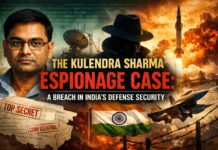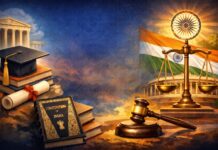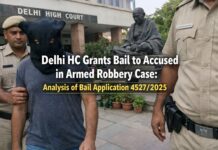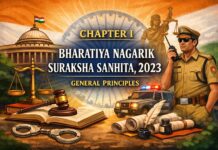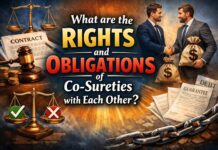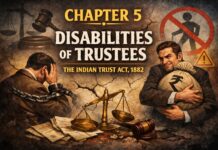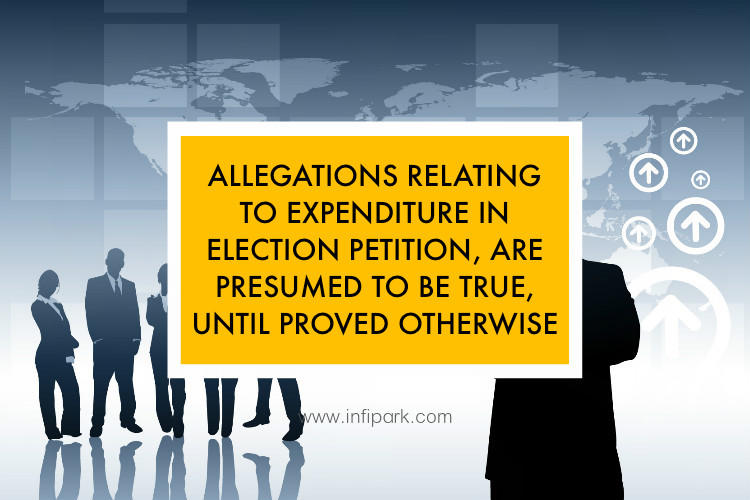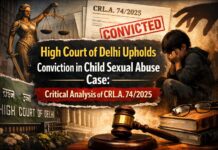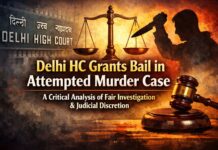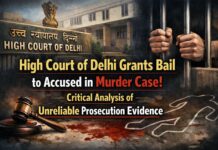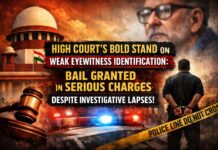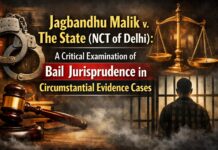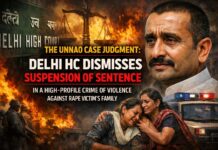AJAY ARJUN SINGH-THE APPELLANT WAS THE RETURNED candidate from 76 – Churhat Assembly Constituency of the State of Madhya Pradesh in the General Elections held in the year 2013. He was a candidate sponsored by the Indian National Congress Party and won by margin of 19,356 votes. Challenging the legality of the election of the appellant, the first respondent herein, one of the other candidates at the said election, filed Election Petition No.1 of 2014.
The appellant herein filed I.A. No.12911 of 2014 invoking Order VI Rule 16 of the Code of Civil Procedure Code, 1908 (CPC) praying various paragraphs of the election petition be struck off [1] on the ground that the allegations contained in those paragraphs are frivolous and vexatious etc. By the order impugned in this appeal, the said I.A. was dismissed. Hence the instant appeal.
Before the Supreme Court examine the various questions that arise in this appeal, the Court think it profitable to examine the scheme of Order VI, Rule 16.
“16. Striking out pleadings – The Court may at any stage of the proceedings order to be struck out or amended any matter in any pleading –
(a) which may be unnecessary, scandalous, frivolous or vexatious, or
(b) which may tend to prejudice, embarrass or delay the fair trial of the suit, or
(c) which is otherwise an abuse of the
process of the Court.”
The very purpose of the Rule is to ensure that parties to a legal proceeding are entitled ex debito justitia to have the case against them presented in an intelligible form so that they may not be embarrassed in meeting the case[2]
In the context of the application of Order VI Rule 16, CPC to the election petition, Supreme Court in Bhikaji Keshao Joshi and Another v. Brijlal Nandlal Biyani and Others [AIR 1965 SC 610] held that a court examining an election petition may order striking out of charges which are vague[3] In Ponnala Lakshmaiah v. Kommuri Pratap Reddy and Others [2012 (7) SCC 788], Supreme Court considered the scope of an application under Order VII Rule 11 CPC. Such an application was filed by the returned candidate praying that the election petition be dismissed for non-disclosure of any cause of action. Supreme Court opined that for the purpose of determining such an application, the averments in the election petition must be taken to be factually correct and thereafter examine whether such averments furnish the cause of action for granting the relief to the petitioner. Such a conclusion was recorded on the basis of the law laid down in an earlier judgment of Supreme Court[4]. We are of the opinion the same principles of law are applicable even while adjudicating the application under Order VI Rule 16.
In the light of the above principles of law, we proceed to examine the case on hand. The election of the appellant is challenged on the ground of commission of various corrupt practices falling under Section 123(1), 123(3) and 123(6) of the Representation of the People Act, 1951 (hereinafter referred to as “the Act”):
“123. Corrupt practices.-The following shall be deemed to be corrupt practices for the purposes of this Act:-
(1) “Bribery”, that is to say-
(A) any gift, offer or promise by a candidate or his agent or by any other person with the consent of a candidate or his election agent of any gratification, to any person whomsoever, with the object, directly or indirectly of inducing-
(a) a person to stand or not to stand as, or to withdraw or not to withdraw from being a candidate at an election, or
(b) an elector to vote or refrain from voting at an election, or as a reward to-
(i) a person for having so stood or not stood, or for having withdrawn or not having withdrawn his candidature; or
(ii) an elector for having voted or refrained from voting;
(B) the receipt of, or agreement to receive, any gratification, whether as a motive or a reward-
(a) by a person for standing or not standing as, or for withdrawing or not withdrawing from being, a candidate; or
(b) by any person whomsoever for himself or any other person for voting or refraining from voting, or inducing or attempting to induce any elector to vote or refrain from voting, or any candidate to withdraw or not to withdraw his candidature.
—–
(3) The appeal by a candidate or his agent or by any other person with the consent of a candidate or his election agent to vote or refrain from voting for any person on the ground of his religion, race, caste, community or language or the use of, or appeal to religious symbols or the use of, or appeal to, national symbols, such as the national flag or the national emblem, for the furtherance of the prospects of the election of that candidate or for prejudicially affecting the election of any candidate:
Provided that no symbol allotted under this Act to a candidate shall be deemed to be a religious symbol or a national symbol for the purposes of this clause.
—–
(6) The incurring or authorizing of expenditure in contravention of section 77.” i.e. bribery, soliciting votes on the ground of religion and incurring of expenditure in contravention of Section 77 of the Act.
The allegations regarding the commission of corrupt practices falling under Section 123(1) are to be found in para 19 of the election petition. The allegations regarding commission of corrupt practices falling under Section 123(3) are contained in paragraph 18 of the election petition, which is not one of the paragraphs which was prayed to be struck off[5].
All the remaining paragraphs which were prayed to be struck off, pertain to the allegation of corrupt practice falling under Section 123(6). The allegations contained in each one of these paragraphs pertain to the expenditure incurred under different heads by the appellant in connection with the election campaign[6]. According to the Respondent the total amount of expenditure so incurred by the appellant is in excess of the limit prescribed under Section 77 of the Act.
The allegations contained in para 19[7] of the election petition are not disputed by the appellant. On the other hand, he chose to explain his conduct in para 24 of the I.A.
“24. The answering respondent hereby respectfully submits that an amount of Rs. 20 lacs is earmarked for expenditure by every member of the M.P. Legislative Assembly every year in his constituency. A Minister and Leader of Opposition are provided Rs. 20 lacs per year for voluntary grant. The manner in which this grant is to be distributed is the sole discretion of such Minister/Leader of Opposition. The Minister/Leader of Opposition gives a list to the Secretary of the Vidhan Sabha containing the names of the persons and the amount to whom the grant is to be made. Accordingly, the drafts are issued to the persons concerned as per procedure.”
The Supreme Court found that there was no error in the order of the High Court in refusing to strike off the pleading in para 19 to the election petition. However, the Supreme Court examined the validity of the impugned order in so far as it pertains to the incurring of expenditure by the appellant beyond the permissible limits prescribed by law. The Supreme Court held in the absence of any allegation that the appellant used the halicopter for traveling within 76- Churahat Constituency for the purpose of campaigning, the expenditure incurrred on that account cannot be included in the election expenditure of the appellant. Therefore Supreme Court held para 14M of the election petition was liable to be struck off and accordingly struck of the same. The appeal was therefore partially allowed striking out only paragraph 14M of the election petition.
The operative part of the judgment reads as under:-
The allegations contained in para 19 of the election petition are not disputed by the appellant. On the other hand, he chose to explain his conduct in para 24 of the I.A.
Whether the explanation is factually correct and, if so, what are the legal implications of the said explanation are matters to be decided in trial of the election petition. If the explanation is either found to be untrue or legally unacceptable, the allegation made in para 19 of the election petition is sufficient to hold that the Appellant is guilty of the corrupt practice under S. 123(1). Therefore, we do not find any error in the order of the High Court in refusing to strike off the pleadings in para 19 of the election petition.
The allegations and counter allegations regarding the quantity and quality of the material used by the appellant during the course of his election campaign and value of such material are pure questions of fact which are required to be established on evidence. The law in this regard as already noticed is that until proved otherwise the allegations in the election petition must be presumed to be true. The burden of establishing the truth of all those allegations is essentially on the respondent/election petitioner. We have meticulously gone through the various allegations in this regard contained in various sub- paragraphs of paragraph 14 and we are of the opinion that there is nothing which warrants striking out of all those pleadings invoking Order VI Rule 16 CPC. Each of the paragraphs contains allegations that the appellant incurred some expenditure (specified) under some head or the other. The sum total of such amount would exceed the permissible limits of expenditure under Section 77 of the Act.
We accept the submission of the election petitioner. The values fixed by the Election Commission or its functionaries are not conclusive. There is no statutory basis for such an exercise. The valuation made by the Election Commission obviously would be based on the samples supplied by the candidates. There can never be any presumption that the candidates used the same quality of material in the actual process of campaigning. Apart from that the quantity and the quality of the material used in the election campaign and the real cost of the material actually used by any candidate are always questions of fact, which are required to be established in evidence. We are of the opinion that the High Court rightly rejected the application of the appellant on this count.
It is significant to notice that there is no specific denial by the appellant of the allegation in the election petition that the appellant herein had hired a large number of vehicles to facilitate voters from his constituency to attend the said public meeting. IA No.12911 of 2014 is absolutely silent regarding that allegation. The appellant does not even deny the allegation. We must not be understood to be holding that if the appellant had denied the allegation, such denial would suffice to strike out of the pleadings.
Coming to the second limb of that head regarding the cost incurred for the construction of pandals or barricades in connection with the above-mentioned meeting of Shri Rahul Gandhi, the stand taken by the appellant in the above-mentioned IA is that the said meeting was held beyond the territorial limit of the assembly constituency from which the appellant contested. The Indian National Congress Party’s candidate contesting from Sidhi constituency had declared the expenditure incurred in connection with the said meeting. The appellant is under no legal obligation to make any declaration of the expenditure incurred by him in connection with the said meeting.
Appellant does not make any categoric assertion that he did not incur any expenditure in connection with the said meeting.
It is the admitted case of the parties before us that both Shri Rahul Gandhi and the appellant are star campaigners/leaders of the Indian National Congress Party for the election in question.
However, the entire expenditure incurred (on whatsoever count) by such star campaigners or on behalf of such star campaigners is not exempted under Section 77 for the purpose of determining the total expenditure incurred by any candidate in an election. The language of explanation 1 to Section 77 makes it clear that only the expenditure incurred by the star campaigner that too on account of travel for propagating the programme of the political party is excluded for the purpose of computing the expenditure incurred by the candidate. In other words, the expenditure incurred in connection with arrangements like erection of pandals etc. for a meeting of a star campaigner does not form part of the exempted expenditure under explanation 1. Secondly, under explanation II, the star campaigners’ travel expenditure must have been incurred by the star campaigner himself. It is obvious from the opening clause of explanation 1 “the expenditure incurred by leaders of a political party”. If such expenditure is incurred by any person other than the star campaigner, different considerations would arise.
The application i.e. IA No. 12911 of 2014 does not disclose on which one of the grounds contemplated under Order VI Rule 16, the various paragraphs of the election petition are required to be struck out. On the other hand, the appellant gave an elaborate explanation with respect to each of the allegations contained in the various paragraphs of the election petition which are prayed to be struck out. The moment court is asked to examine the defence of the returned candidate in an election petition, the election petition can neither be dismissed for want of cause of action nor any part of the pleading can be struck out under Order VI Rule 16. In the absence of the availability of any one of the grounds mentioned in Order VI Rule 16, CPC striking out is impermissible. As observed by this Court in the context of the application under Order VII Rule 11, the averments contained in the election petition at this stage must be presumed to be factually correct. The only possible scrutiny of such statement is whether those allegations are relevant in the context of the relief sought in the election petition. None of the allegations contained in the various sub paragraphs of paragraph 14, except paragraph 14M, can be said to be irrelevant in the context of the prayer in the election petition.
Authorities relied upon : AIR 1965 SC 610, 1876 (1) QBD 374,
Reference : Supreme Court. Ajay Arjun Singh v. Sharadendu Tiwari & Others, Civil Appeal No. 8254 of 2016 (Arising out of SLP (C) No. 4512 of 2015)



